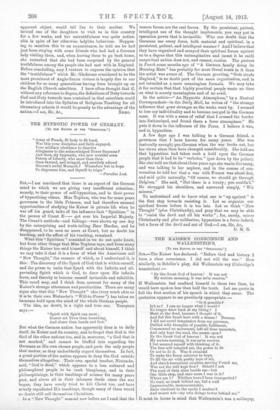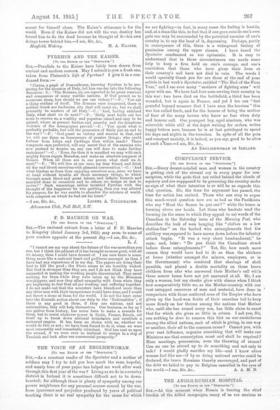THE KAISER'S CONSCIENCE AND WALLENSTEIN'S.
[TO 21111 EDITOR OF THE "SPECTATOR.")
Stu,—The Kaiser has declared: "Before God and history I have a clear conscience. I did not will the war." How similarly, in Schiller's play, did Wallenstein say (Coleridge's translation) :— "By the Great God of heaven! It was not My serious meaning, it was ne'or resolve."
If Wallenstein had confined himself to these two lines, he would have spoken leas than half the truth. Let me quote in full the first section of his speech in which they occur. The quotation appears to me peculiarly appropriate :—
"Is it possible P Is't so ? I can no longer what I would ?
No longer draw back at my liking ? I
'Must do tho deed, because I thought of it,
And fed this heart hero with a dream ? Because I did not scowl temptation from my presence, Dallied with thoughts of possible fulfilment, Commenced no movement, left all time uncertain, And only kept the road, the access open ?
By the Great God of heaven ! It was not My serious meaning, it was ne'er resolve.
I but amused myself with thinking of it. The free-will tempted me, the power to do Or not to do it. Was it criminal To make the fancy minister to hope, To fill the air with pretty toys of air, And clutch fantastical sceptres moving t'ward ma, Was not the will kept free ? Beheld I not The road of duty close beside me—but One little step, and once more I was in it ? Where am I? Whither have I been transported? No road, no track behind me, but a wall Impenetrable, insurmountable,
Rises obedient to the spells I inutter'd And meant not—my own doings tower behind me."
It must be borne in mind that Wallenstein's was a soliloquy, meant for himself alone. The Kaiser's utterance is for the world. Even if the Kaiser did not will the war, destiny has forced him to do the deed because he thought of ft—his own doings tower behind him.—I am, Sir, &c., Mayfield, Woking. n. A,. HAINES.



































 Previous page
Previous page